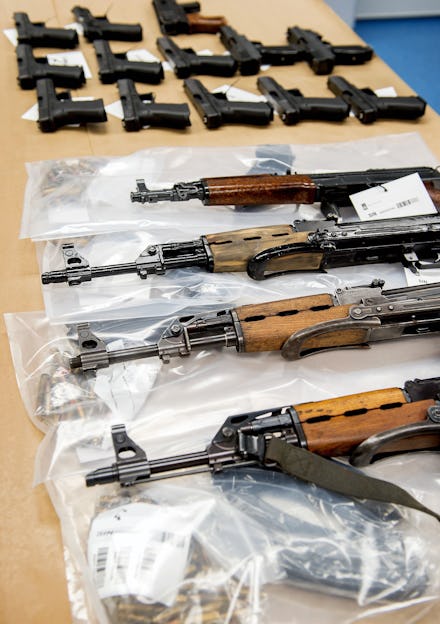30 Years After Banning the Sale of Machine Guns, Here’s How Easy It Is to Buy One

In the Kübler-Ross model of post-gun-massacre grief that Americans display after yet another gunman uses yet another gun to commit yet another atrocity, the reaction to the mass shooting at an Oregon community college that left 10 people dead, including the shooter, was disconcerting in its predictability. First came the heartbreak; then came the anger; then came the blame; then, inevitably, came the insistence that such violence is impossible to stop.
"Criminals don't follow gun laws. Only law-abiding people follow gun laws," said Florida Sen. Marco Rubio, a Republican presidential candidate. Fellow candidate Dr. Ben Carson declared that "gun control only works for normal law-abiding citizens — it doesn't work for crazies." Former Florida Gov. Jeb Bush shrugged, "stuff happens." Though the arc of America's predisposition towards gun violence may be long, it bends towards apathy.
Calls for legislation aimed at curbing American gun violence, which knows no equal in the developed world, were deemed useless at best. "I keep waiting for someone to tell me what new gun law can we past that would have prevented this shooting or Sandy Hook or Aurora or Charleston," former Arkansas Gov. Mike Huckabee said of the massacre, perpetrated by a shooter who lived with 14 legally acquired firearms despite having been involuntarily committed for mental health instability. "Just tell me what gun law that is because I've yet to have somebody tell me what that is."
Fortunately for Huckabee, a law that could serve as a model for one that could drastically reduce mass shootings has been on the books for nearly three decades.
The law: The rise of the modern National Rifle Association as an un-crossable political monolith has meant that the proliferation of deadly weapons has only been outpaced by that of bumper stickers stating "If guns are outlawed, only outlaws will have guns." But recent history suggests otherwise — because the most stringent national ban on firearms still on the books continues to work nearly 30 years after its implementation.
That law, the Firearm Owners' Protection Act of 1986 (FOPA), was originally written to curb perceived oversteps committed by what is now the Bureau of Alcohol, Tobacco, Firearms and Explosives. After months of lobbying by the NRA, the bill, which would undo many of the provisions enacted by the Gun Control Act of 1968, approached a vote on the House floor.
But before the final vote in the House of Representatives, New Jersey Democrat William Hughes introduced an amendment that would come to define the bill for decades thereafter: a provision that banned civilian ownership or sale of all automatic weapons — that is, any weapon that fires continuously as long as the trigger is depressed, such as a machine gun — manufactured after FOPA's passage.
The so-called "Hughes Amendment" didn't perturb the NRA enough to spur opposition, and the bill was passed by a Democratically controlled Congress, then signed into law by President Ronald Reagan. Upon his signature, the sale of new machine guns to or between civilians was effectively banned.
And it worked: Ownership of automatic weapons wasn't banned outright — the proposition of collecting hundreds of thousands of such firearms from owners across the country would be daunting even if the firearms in question weren't capable of firing up to 950 rounds per minute — but it was intensely regulated.
To procure an automatic weapon made before 1986, gun collectors are required to obtain a special ATF license, undergo a background check, pay a tax on the firearm and even designate a licensed gun dealer who will receive the weapon in the event of your death. (Literally taking it from one's cold, dead hands, as it were.)
Even then, a would-be owner has to deal with the insanely high cost of a legal automatic weapon. With the vast majority of the 543,073 registered automatic weapons in the U.S. belonging to law enforcement, according to the ATF, the cost of a pre-1986 weapon can run well into five figures.
As a result of FOPA's implementation, machine guns were largely regulated out of circulation. The law choked off a major point in the machine-gun supply chain used by professional crime syndicates for whom they were the weapon of choice: In 1980, machine guns were used in 23% of homicides in cartel-ridden Miami. Machine gun deaths are so rare today that it's nearly impossible to find data on any crimes involving automatic weapons at all.
To be fair, automatic weapons sales haven't been nearly as prolific as sales for handguns since the 1930s, when the passage of the National Firearms Act mandated onerous taxes, fingerprinting and a national registry of Americans who owned automatic weapons. Such weapons were largely already out of civilian hands by the time FOPA was passed. But the success of FOPA, and the NFA before it, in limiting access to the deadliest of deadly weapons further underscores the notion that legislative action, particularly regulation on access and sale of firearms, can have a meaningful impact on crime committed using those firearms.